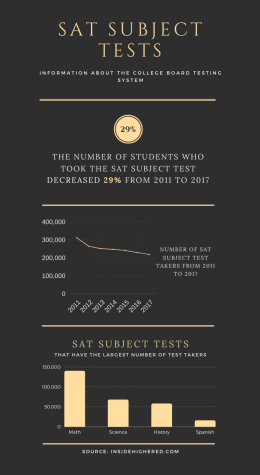The permanent cancelation of the SAT subject tests are creating equality in the college admission process | Licensed under CC BY-SA 2.0
COVID admissions
How the cancellation of the SAT subject tests helps students and increases equity in college admissions
On Jan. 21, College Board announced that it would permanently remove the SAT subject tests to adapt to changing admission processes due to the pandemic. The tests were immediately canceled in the U.S., with only international students being able to take the tests until the end of June.
While the SAT subject tests were highly controversial in the past, it was ultimately COVID-19 that played the most influential role in College Board’s decision, as many students could not take the tests due to lockdowns. Even though the elimination of SAT subject tests is a significant change in college applications, it ultimately provides a positive impact on the college admission process for high school students.
The SAT subject tests were taken by students to prove their mastery in a certain subject. As the tests were not mandatory, and a low score on the test could negatively affect students’ college applications, the subject tests were mainly taken by students who were confident in the topic and had a chance at receiving a high score, according to the Princeton Review. In 2019 SummitPrep reported that 24% of the students who took the Math Level II SAT subject test scored an 800, a full score. Thus, students had to get a perfect score on the test to simply become a part of the top quarter of other test-takers.
The importance of the SAT subject tests further eroded due to the rising importance of Advanced Placement (AP) tests during high school. Both the AP tests and the subject tests evaluated how well a student learned a certain topic and how ready they are for college-level classes. Because students who take both types of tests are assessed under similar criteria, the need to take both has greatly decreased over the last few years. InsideHighered reported that in 2011,

students took at least one SAT subject test, but in 2017, the number decreased to 219,000 — a 29% decrease.
“We have found that the best predictors [of grades] at Harvard are AP tests,” dean of Harvard admissions Rick Shaw said in an interview with the PrepScholar. “It is closely followed by the College Board subject tests and the International Baccalaureate Exams.”
As Shaw mentioned, the reason students preferred to take AP tests over the SAT subject tests in the past was influenced by how much value colleges put on the two tests. PrepScholar analyzed that AP tests tend to require a deeper understanding of a topic, as essays and free response sections in those exams require more stamina and conceptual understanding than the subject tests, which are only made up of multiple choice problems. AP test results also provide a standard metric for measuring students’ proficiency in a subject that extends beyond the variability of different high school grading systems. For example, a 2 on the AP test and an A in the class would mean that the class was overly easy. On the other hand, a 5 on the AP test and a B in the class would show that the class was challenging to many.
The elimination of the SAT subject test is a positive change in the college admissions process, as high school students no longer have to study for both the AP and subject tests at the same time. This change significantly decreases their stress and reduces the competitive environment among their peers, an issue especially prevalent at MVHS.
Additionally, the absence of the subject tests has given students the opportunity to develop interests in other activities such as clubs, volunteer work and sports. In the long term, this will help increase the number of career choices available to students, as experiencing different activities will help expand career paths more than simply sitting in front of a desk and studying.
The end of the SAT subject tests played a role in decreasing the amount of importance test results have in college admissions. Colleges will be able to judge students in a more holistic view instead of focusing on their test-taking abilities, and students will have the opportunity to display their interest in a variety of other activities.
The cancellation of the SAT subject tests has also opened the door a little wider to disadvantaged students in regards to college applications. CNBC reported that for all SAT standardized tests, students who come from families with a yearly income of less than $20,000 received significantly lower scores than students with families earning over $200,000 in yearly income. Factors such as the cost of the test and the affordability of preparation resources influenced the difference in the scores. However, with the SAT subject tests now out of the picture, the college admission process can become a more level playing field for students, regardless of their economic status.
While many students struggled to adapt to the rapidly changing college application process due to COVID-19, the pandemic also showed how the removal of certain tests can bring a positive change to students and colleges alike. There are still problems that remain in the college application process, such as racial disparities and extensive amounts of application essays, but the SAT subject test cancellations will hopefully serve as an example and later lead to other reforms within college admissions.

